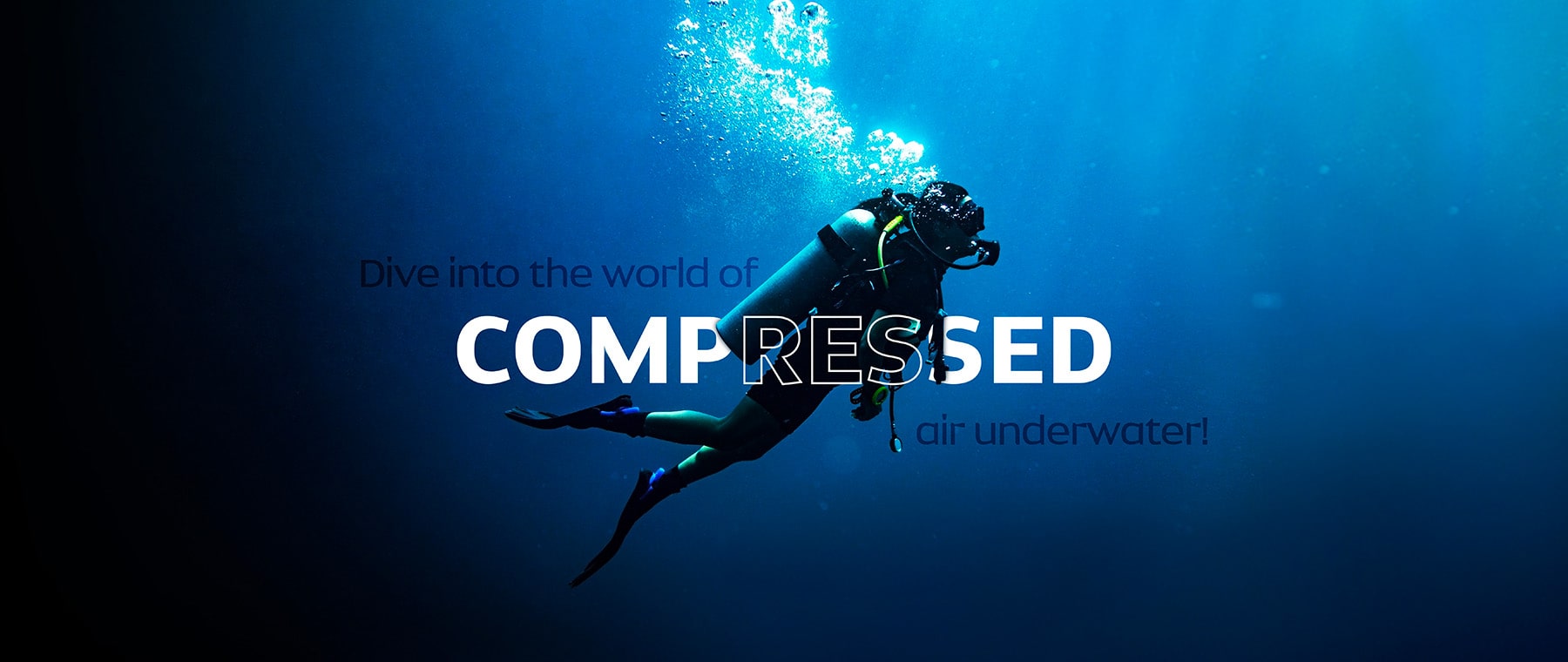Consultant - Screw compressorDIVE INTO THE WORLD OF COMPRESSED AIR UNDERWATER!

The largest portion of earth's surface covered by the blue carpet in the form of ocean, rivers, lakes and ponds often fascinate human beings around the world to think, explore and get awed by its magnificence. One of the best ways to get under water, whether for professional purpose or for recreational purpose, is Scuba diving.
SCUBA stands for “Self Contained Underwater Breathing Apparatus” and it is the paramount element of marine exploration.
The major aspect that confines our time and experience underwater is the air that we carry in our SCUBA tanks. Air, Ah!! It's simple when we hear it as a term in itself. But when it comes to using air in SCUBA, we must understand its forms first.
Right from our early schooling we have learnt that the air we breathe is a composition of nitrogen and oxygen majorly, as well as water, carbon dioxide, ozone, and many other compounds in small traces. But little did we know that the same atmospheric air is compressed, to utilize as a fourth form of energy in many industrial applications. The pressure range in which air is compressed depends on the use case. While for SCUBA, normal atmospheric air is compressed and filtered, so the divers can take more of it with on their underwater trip.
Compressed air is the typical gas used for recreational diving, while Nitrox, Trimix and Heliox gas mixes are used for technical diving in deep waters. Divers use a pressure regulator (in their mouth-piece) to bring back the air from high pressure to atmospheric pressure (when at the surface) or the local underwater pressure, depending on the depth.
While underwater, compressed air is utilized at varied levels which is a factor of the depth it is breathed at. For us to visualize - If you are a diver descending into the ocean, for each foot you will experience an increase in pressure by 0.44 psi roughly for sea water and this is a tad bit less for freshwater SCUBA as both the air pressure at the water's surface, and the water pressure, will act.
The scuba diver uses a mouthpiece with a pressure regulator to retrieve the air from high pressure to atmospheric pressure, or to the required pressure based on the depth.
SCUBA tank filling air compressors are similar to the ones used to deliver air for firefighters and for oxygen tanks in hospitals but the vital difference is the pressure and compressed air quality output from the compressor.
- Pressure
For SCUBA, when compressed air is being used, based on the way air is carried, a low pressure or a high pressure compressor is chosen.
a. Low-Pressure Compressors
For surface supplied diving, low-pressure compressors are used. These compressors are lighter in weight compared to the conventional compressors so as to carry in flotation rings that float on the surface of water and they supply underwater divers with air via a hose. Typically pressure range for surface- supplied diving compressors range from 15 psi to 130 psi maximum.
b. High-Pressure Compressors
Divers carry compressed air in Aluminium or Steel tanks for breathing underwater, in this scenario air is compressed in ranges between 3,200 and 5,000 psi.
The compressor's Free Air delivery/ output flow is a factor of the tank size and number of tanks that needs to be filled.
Compressed air quality
For SCUBA it is mandatory that the compressed air is of breathing quality. A compressed air system can contain contaminants that affect the quality of breathing air from sources like compressor oil, system leaks, inadequate filtration and environmental variables. Hence filtration plays a crucial role.
Mostly the filtration and moisture separation system is separated from the compressor system, hence downstream filters, moisture separator and dryers are preferred, to ensure the compressed air complies with breathing air standards. Apart from regular filtration, the compressed air is passed through a sequence of activated carbon filters that gets rid of hydrocarbons and carbon monoxide (CO).
We must keep in mind it is important to choose the right compressor that inherently does not pass over excess moisture, oil, dust particles and other contaminants as excess moisture can cause overloading of the drier, and moisture separator. If left unnoticed, it may lead to deprivation of compressor filtration, fault in regulators, corrosion and oxidation of scuba tanks. While excess oil could increase excess CO, CO2 and hydrocarbon levels in compressed air.
In order for humans to have a safe and fun underwater experience, making sure you have the right tank and air supply is essential for a successful dive. At ELGi, all our compressors are built with best in class features unique to our brand for keeping moisture and oil carryover as much within the limits as possible. We study the application in-depth before suggesting the compressed air system with the suitable air quality and right size.
